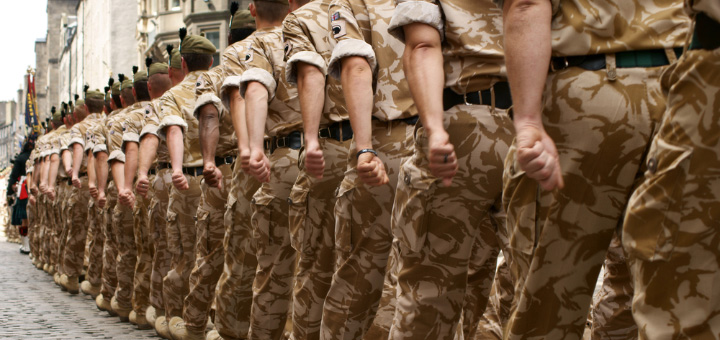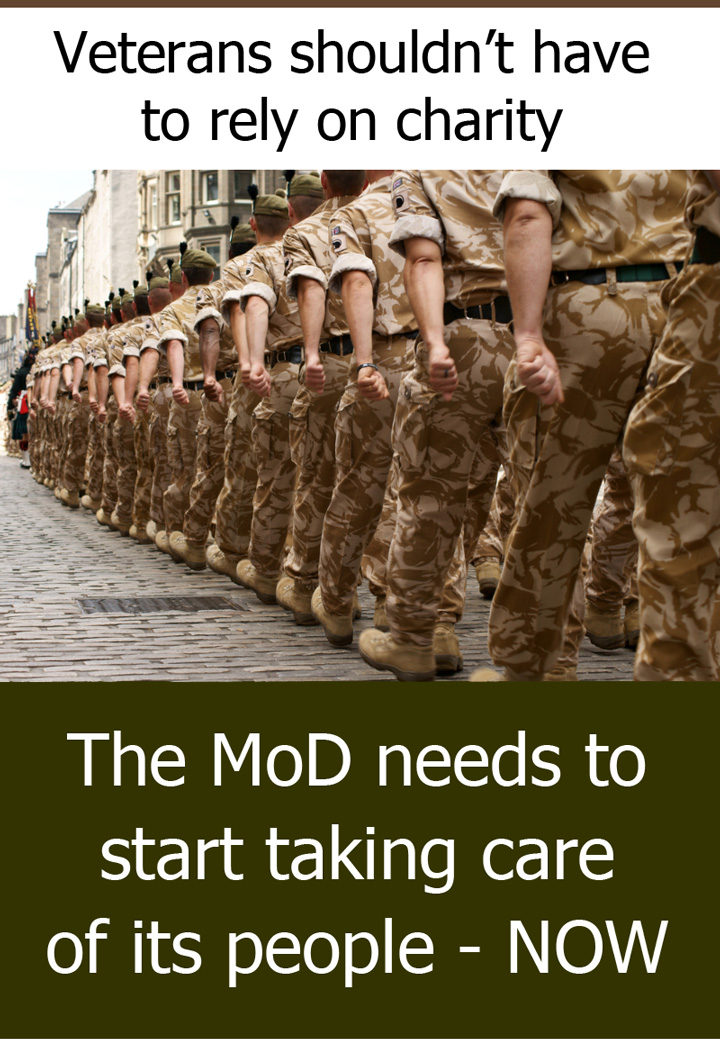The MoD have always been unwilling to acknowledge that military service can have adverse effects on people. Their preferred message follows those pumped out by military recruitment campaigns: “Be the Best”, “thousands of jobs available”, in “hundreds of different careers”.
Today The Royal British Legion TRBL launches a survey of Service-related hearing problems. It’s hardly surprising that Service people have three times more ear complaints and difficulties with hearing than civvies. When each bullet from a high-velocity weapon (like the Army’s standard SA-80 rifle) breaks the sound barrier just in front of the muzzle, the “sonic boomlette” is real wrecker of higher frequency hearing, plus generates ear damage that leaves many soldiers with tinnitus.
This cannot be prevented by the way… For the benefit of MoD’s liability-avoiding officials, you don’t wear ear defenders on operations. You could, but then you’d end up being shot and blown up a lot more times by enemy you’d otherwise have heard…
Pretty much all Special Forces soldiers have tinnitus – from the white noise sound produced by HF radios – as well as from weapon use. Headphones have to be worn for hours on end, and the MoD never thought to include a noise gate type of filter for this damaging sound (as they did for the more common VHF radios).
Most, if not all, paratroopers have back problems, thanks to that brutal combination of standing for hours in the aircraft with SOP load bergans strapped to the front (plus reserve ‘chute) and the main ‘chute on the back. Each jump an orthopaedic surgeon’s jamboree…
The problems that are highly visible and attract public sympathy get far more attention than these unseen problems. But even with amputees, and the need to get those who could continue serving, back on their feet, it took Help for Heroes to provide the money to sort out the MoD’s provision of good quality artificial limbs.
I haven’t yet mentioned PTSD, and the similar and associated mild traumatic brain injury. And there’s yet another, currently low-key but very distressing and serious problem – long-term pain control in wounded people who develop untreatable neurological pain. This problem will emerge in due course.
TRBL’s hearing survey is part of a much-needed assessment of how people are affected by military service. Everyone should take part – please… And there should be further studies into back pain etc. Of course the MoD’s standard response is to quote the highest figures of civilian incidence of say hearing loss or low back pain, and reply that the incidence of whatever it is, is the same – or less – than in civvie street.
This is pure humbug. Soldiers are not civilians. They were trained well to do the things they did – including the physical fitness needed. They did them properly. These things are tough often dangerous. At the time, no one hesitates to do these things; and now, veterans do not seek to somehow undo the fact they did them.
But when they went to war, and did the things that are making them suffer now, they did so believing they’d be properly looked after if things went wrong. No one is seeking to sue the MoD for making them do these things – or for damaging them (assuming of course that the damage isn’t due to actual MoD negligence, which in war it mostly isn’t).
It’s just not acceptable to say, for example, that the rates of suicide in the Army are less than those of Civvie Street, so everything’s OK. Soldiers are selected and highly trained. They’ve often survived multiple life-threatening situations, lost friends, and spent long periods deeply and fundamentally frightened. Many have been very seriously hurt. The reason military suicide rates are less than civvie ones is because these are very special people.
The most suicide-prone civvie group is young males – the exact age profile of the Army. This is because of unemployment-related factors. Conversely, young guys join the Army to get away from this. Therefore none of those factors apply to them. The guys who kill themselves do so for other reasons. To compare them with civvies is disgraceful.
The MoD doesn’t try to find out how military service affects veterans. We’re the NHS’s responsibility. Many medical conditions develop after Service – people come forward admitting suffering PTSD for example after an average of 13 years of individual struggling and suffering.
The MoD says there is no problem with PTSD in the serving population…
Well actually there is. But MoD does admit to a serious problem with “alcohol misuse”. Self-medication?
Hearing is dealt with in a similar fashion. Everyone loses hearing with age, so the MoD isn’t responsible.
What needs to change is for research to be done into exactly how Service people are affected, for two reasons. Firstly to protect those serving so they can continue to defend us all, and then enjoy long and healthy retirement. But secondly, to prevent the serving population from losing faith in the MoD’s desire to look after them.
If this faith is lost – and it’s looking very fragile right now, recruitment will dry up, and the MoD will increasingly be subject to the sort of legal action that seems to be preventing it from taking these necessary steps.
The MoD should be investigating veteran’s hearing, not TRBL. But realistically, if the MoD did this, a lot of us wouldn’t bother filing in the questionnaires. We’d think they’d just be processed cleverly to produce the result the MoD wants. Already, trust of the MoD has evaporated.
This is a big problem, which the MoD’s most senior military commanders must address urgently. But not the MoD’s military medical people. They are a very powerful lobby, which seems for reasons of its own to prefer not knowing to doing research.
The medics fear litigation, and so advise the senior commanders accordingly. Whereas what Service people want is to be looked after – not so they can avoid damage or sue the MoD, but so they can carry on doing their jobs – regardless of how dangerous those jobs are.

